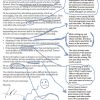
KJIPUKTUK (Halifax) – Being poor and having to rely on social assistance in Nova Scotia is something you wouldn’t wish on your worst enemy.
But to improve the system is difficult. Poverty activists find it is awfully hard to keep poverty issues in the public eye, and to hold politicians and senior bureaucrats accountable.
Some Nova Scotia activists have been at it for a very long time. Jeanne Fay is one of those people.
That’s why the Halifax Media Co-op went to Lunenburg for a chat. Anti-poverty activism has been happening in Halifax for decades, but our collective memory is short. There’s a lot to learn.
In this interview Fay reflects on welfare rights, white middle class privilege, Princess Anne, why we should stop being so damn polite, and a whole lot more.
Fay remembers first becoming aware of poverty when sometime in the mid-sixties a teacher invited a member of a local welfare rights group to her university class in New Hampshire.
“She came to the class, talked about her life, how hard it was, and how horrible welfare was. And I was just stunned to hear that because I had no experience with that. We weren’t rich, but certainly not that kind of poverty, and I didn’t know anybody who was like that.
One of my fellow (male) students went on for some length how the problem was that poor people were having too many children. I don’t remember, but he may well have talked about the need for sterilization. It was as if she wasn’t even in the room.
I was watching her face and he devastated her, she started to cry, she interpreted what he said as wanting to take away her children, because that has always been the fear of women in poverty.
That was for me the seminal experience for understanding that there was an whole systemic issue there that I knew nothing about.”
Right there and then Fay became a welfare rights activist. First in New Hampshire where she attended university, then Pittsburgh, and then in Nova Scotia by way of Toronto, once she left the States to get away from the Vietnam war.
After a stint in the Town of Canso in rural Nova Scotia, Jeanne worked in Halifax for some twenty years as as a caseworker for Dalhousie Legal Aid. She also taught, first part time, then full time, at the Dalhousie School of Social Work. Currently she is the executive coordinator at the Second Story Women’s Centre in Lunenburg.
She almost changed careers very early on.
“Early on I was recruited for VISTA, Volunteers in Service to America, which back then was called the domestic peace corps. We were all middle class white kids, hired by the federal government to work in communities and organize.
It was great, but halfway through the two weeks of training they decided I wasn’t suitable, and I was asked to self-deselect, as it was called. They thought I was too quiet, but the truth is that I was intimidated as hell, it was all so new.
But I said no, I am not going to quit. I always think back to that and wished I could write them and say ‘hi, I am still here’.”
Looking back on some 35 years of fighting poverty in Canada.
I don’t think a lot has changed in terms of the welfare system. If anything it’s gone backwards a bit. When I first came to Canada, when we worked in Toronto, welfare was a shared responsibility between the feds and the provinces. Then the feds pulled money out of it. People assume welfare is a provincial responsibility but it hasn’t always been like that.
The core structure of social assistance has not changed. The entire legislation needs to change. I looked at the progression of welfare law all the way from colonial times here in Nova Scotia, and there is a continuum. Sure some things have changed and the categories of people considered worthy now have expanded, but the basic underlying attitudes and principles have not changed. Mostly I am thinking here about the notion that there are deserving poor and people who should be working but abuse the system.
A while ago I went to a Social Assistance transformation consultation. I went to one of the sessions down at White Point Lodge. As long as we tie Income Assistance to the labour market it will continue to be the same punitive system. Community Services wants us to believe that sometimes people on Income Assistance receive more money than people on minimum wage. However, their figures don’t add up. But as long as that notion is entrenched in the system things will not change.
One glimmer of hope
It’s been a long time since I have seen so much critical coverage of our welfare system, especially coverage from the perspective of people living in the system, and I think it is having an impact. It’s because of the work of people like (documentary maker) Jackie Torrens. We’re talking about a young generation too. I have been gratified to see that happen. After all, every generation we have to educate all over again.
What I so hoped for, but what the NDP government didn’t do, was to show some leadership in changing these negative attitudes that are out there. Not to be afraid to talk about welfare as a matter of justice, and taking on all those myths and stereotypes..
These negative attitudes towards welfare recipients have also affected activists. In all the groups I worked with in Halifax over the years there was a real fear of being too radical. People were afraid they’d lose their assistance, or didn’t want to identify themselves as being on Income Assistance because of the stigma.
Common mistakes
I worked at Dal Legal Aid for 20 years, a very privileged position, working for an institution I sometimes would call a colonial power, where we are happy to get the good vibes for helping poor people, but often would not support a bit more radical activism.
What happens is that the institutions of power, social work, law, what have you, suck up our energy so we are not doing the door knocking and organizing that needs to be done. Organizing is a full time job and it is really hard to do when you are also doing individual casework. Nonetheless, the only way the system will change is if people can organize enough so the politicians listen up and take this more seriously.
Acorn Nova Scotia is pushing the envelope in how we need to go about things. I am always praising Evan (Coole) and all those young people for the work they are doing, I think it is really great.
We must find powerful allies, and bring them in. Early on, while working at Dal Legal Aid, the welfare rates hit a new low, mostly shelter allowances not keeping pace with reality. The Nova Scotia Association of Social Workers and Nova Scotia’s nutritionists both wrote scathing reports and embarrassed Edmund Morris, the then minister of Community Services, into increasing the rates.
Putting power and privilege to good use
In the early nineties there were riots in the North End and on Barrington Street when an African Nova Scotian man from Preston was refused entry into a downtown bar. I remember driving to work thinking what we should do, and wondering if it is even my place to do anything. And then when I walked into work there was Rocky Jones, and he looks at me and says, Jeanne, come with us.
And there I found myself in the North End library looking at a sea of white reporters. I had become the token white person, and that opened my eyes.
It taught me that in order to get a handle on the different perspectives you must put yourself in the action. I have always been a middle class well-paid advocate, and one thing I have learned is that I have power and privilege because of what I am. My job is to figure out how to use that power in a way that furthers the cause.
Revolution, activism, empowerment
In order to address poverty there has to be a redistribution of wealth and income. Wealth is actually more stubborn.
When I first started at Dal Legal Aid I talked about organizing as what we are doing while we are waiting for the revolution. But I have changed my attitude a bit. I now try to create that revolution every day, and it is more about relationships. But in a way it is tinkering with a bad system. What I keep hoping is that we reach a tipping point where most people realize that this system is fucking everybody over.
For me the biggest one is to understand that socio-economic location confers various degrees of power and privilege. It is very dangerous to bring your own agenda while working with people living in poverty. I know that it sounds really trite, but it took me a long time to realize that. I was all about making fundamental change, but when you get down to the basics, people want to survive.
That’s not to say they don’t have a political analysis. If I could live my life over again I would spend more time in the community bringing people together to develop their own analysis of the issues. Then take action, and in my experience that makes people more radical.
Saul Alinsky always said that your tactics have to stay within the experience of the people, and outside the experience of the oppressor or the enemy.
That implies that activism is more than writing a letter to a politician or politely lobbying for legislative reform. A long time ago I worked with an anti-poverty group here in Halifax when Princess Anne was visiting. The women in the group were incensed that the government was spending that kind of money on the visit, and yet wouldn’t increase their social assistance so they could afford to buy school supplies for their kids. So they held a demonstration, which absolutely horrified local monarchists.
Another time, in the nineties, Lloyd Axworthy was going around the country to prepare the ground for the devolution of federal involvement in welfare. And I said that we had to prepare a brief, and one of the women replied, ‘what the hell is a brief, for me a brief is men’s underwear’.
From that we developed an action where we got underwear and wrote anti-poverty slogans on them, put them in a laundry basket, marched uninvited into the session, and dumped the laundry and then we marched out. That took some guts.
Those kinds of things give people such a feeling of power and self worth. If they can get over the terror of doing something, that is. We’re all brought up to be polite.
See also: I loved what I did, so I stayed with it. An interview with Paul O’Hara
Click here for additional articles on Nova Scotia’s Income Assistance system.
Follow Robert Devet on Twitter @DevetRobert




Ironically, the Internet is now providing the poor with a great tool for activism, a way to take part in advocacy. The irony is that most people on income assistance cannot afford Internet service and booking a computer for two hours at the library is not conducive to being involved in the process. Also, those with mobility issues and/or serious medical problems (I’m in this category) cannot get to the library easily or at all.